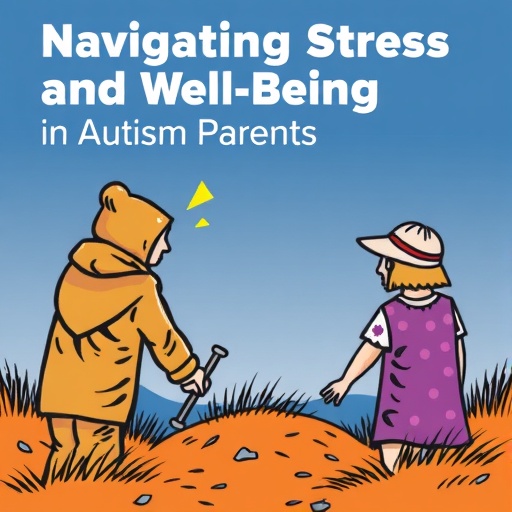In a groundbreaking study that promises to shed light on the intricate experiences faced by caregivers, researchers have delved deeply into the stress, coping mechanisms, and overall quality of life of parents raising children with autism spectrum disorder (ASD). This pivotal research, led by Turnage, Conner, Hinojosa, and their colleagues, aims to illuminate the multifaceted challenges parents navigate while fostering an environment of support and growth for their children with developmental disabilities.
The investigation is rooted in an urgent need to better understand the emotional toll that being a caregiver entails. Parents of children with ASD frequently report high levels of stress and anxiety, stemming from unpredictable behaviors and communication challenges associated with the disorder. The study meticulously examines how these parents cope with the incessant pressures of caregiving, which can often become overwhelming. The emotional landscape is further complicated by societal perceptions and stereotypes surrounding autism, leading to feelings of social isolation and stigma among these families.
One of the central themes of the research is the exploration of coping strategies employed by parents. The study categorizes these strategies into problem-focused and emotion-focused coping. While problem-focused coping involves actively seeking solutions to the stressors at hand—such as engaging with professionals or seeking educational resources—emotion-focused coping may include seeking emotional support from friends or engaging in self-care practices. Understanding these mechanisms is crucial; effective coping strategies can significantly mitigate stress and enhance the quality of life for parents.
The study also outlines the long-term implications of sustained stress on parents. Chronic stress is linked with various health problems, including cardiovascular disease, anxiety disorders, and depression. The findings suggest that parents who effectively manage their stress through healthy coping mechanisms report a better quality of life. This points to an urgent need for community support systems that bolster these coping strategies, providing parents with the tools necessary to thrive rather than merely survive.
Moreover, the role of social support emerges as a critical factor in determining the well-being of these parents. The researchers found that parental perceptions of social support directly correlate with their stress levels and overall life satisfaction. Parents who felt supported by their social networks reported lower instances of depression and anxiety compared to those who felt isolated. This highlights the importance of fostering awareness and understanding within the community regarding the needs of families with children on the autism spectrum.
The ambitions of the research extend into advocating for preventative measures and intervention programs tailored specifically for these parents. Such initiatives could offer guidance on effective stress management techniques and provide a platform for parents to connect with one another. Creating a community where experiences can be shared and resources can be pooled will not only alleviate individual parents’ burdens but can also empower them collectively.
Interestingly, the findings of this study also stress the importance of personalized coping strategies. Each family has a unique dynamic, and what works for one may not work for another. This variability underlines the necessity for tailored interventions, recognizing that a one-size-fits-all approach is often insufficient. Engaging parents in the development of these interventions ensures that the solutions provided are practical and relatable, ultimately leading to more effective outcomes.
Furthermore, as society evolves in its understanding of autism, the need for changes in policy and practice cannot be overlooked. The implications of this research extend to advocacy for increased funding and resources for family support programs at the local, state, and national levels. Policymakers must be informed about the realities that parents face daily, translating this knowledge into actionable resources that alleviate the burdens on families.
The emotional rollercoaster that accompanies parenting a child with autism cannot be overstated. The researchers utilize poignant narratives collected from interviews with parents, illustrating the highs and lows of their journeys. These personal accounts serve as powerful reminders of the struggles faced by caregivers, while also showcasing their resilience and unyielding love for their children. Sharing these stories within the broader context of scientific research provides a human element that can drive change and foster empathy among the general public.
Importantly, the study serves as a significant contribution to the existing body of literature on autism and parental well-being. By drawing attention to the prevalent issues faced by parents, the researchers pave the way for future investigations that can explore more nuanced aspects of caregiving. This can include longitudinal studies that monitor how stress levels change as children grow and how the evolving needs of families can be addressed over time.
In conclusion, Turnage and colleagues reveal a critical intersection between the experiences of parents raising children with autism and the resources available to them. The study underscores the paramount importance of recognizing the sacrifices that these caregivers make and the need for systemic support that can lead to better health outcomes. As the dialogue surrounding autism continues to evolve, it is essential for researchers, practitioners, and the community to engage collaboratively in creating a more supportive environment for families.
Ultimately, this study offers a hopeful vision for the future. It advocates for greater understanding and awareness, encouraging initiatives that uplift parents while promoting their mental and emotional health. The journey of parenting a child with autism is laden with trials, yet it also brims with opportunities for joy, connection, and profound growth—as long as there exists a robust support system to navigate the intricacies of the experience.
Subject of Research: Stress, Coping, and Quality of Life of Parents of Children with Autism
Article Title: Stress, Coping, and Quality of Life of Parents of Children with Autism
Article References:
Turnage, D., Conner, N., Hinojosa, M. et al. Stress, Coping, and Quality of Life of Parents of Children with Autism.
J Autism Dev Disord (2025). https://doi.org/10.1007/s10803-025-07043-z
Image Credits: AI Generated
DOI:
Keywords: Autism, Parenting Stress, Coping Strategies, Quality of Life, Social Support.




